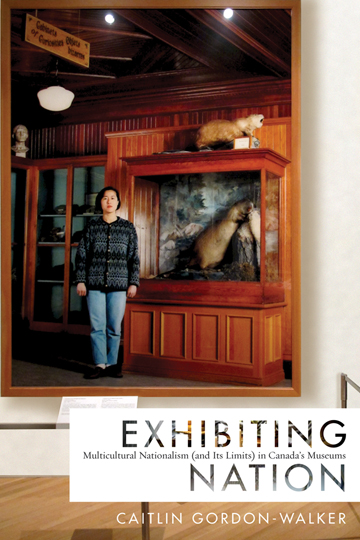Exhibiting Nation: Multicultural Nationalism (and Its Limits) in Canada’s Museums begins with my memories of visiting the Royal BC Museum as a child, as a young adult, and later as a museum scholar. I have a nostalgic fondness for this museum and its exhibitions, but also see reflected within them commonly held narratives of the province and more broadly the nation, which by celebrating a certain form of unity in diversity also work to inscribe particular kinds of limits on the diversity they seek to celebrate.
While my personal sense of uneasiness with these narratives provided the impetus for my research, the research itself was sustained by my interest in two distinct yet intertwined sets of contradictions. The first is expressed within a particular kind of Canadian nationalism – specifically the multicultural nationalism that understands Canada to be a nation that has found unity, not in spite of diversity but precisely because of it. When discussing my research, I often encountered people, especially non-Canadians, who seemed perplexed by my desire to examine Canadian multicultural nationalism from a critical perspective. While I appreciate the positive implications of such a form of nationalism, I recognize that, like every nationalism, multicultural nationalism operates on the joined principles of both inclusion and exclusion. It thus inevitably imposes limits on the kinds of diversity it can accept.
The second set of contradictions is expressed in the institutional setting of the museum. Historically, museums have been authoritative and disciplinary institutions. They encourage certain forms of thought and behaviour and are often seen to represent the Truth. In relation to multicultural nationalism, they tend to represent a unified multicultural nation and promote particular forms of multicultural citizenship. At the same time, museums are organizations of people; in every sense, they are dialogical. This was abundantly clear in my research – in my interviews with curators and other museum professionals, in my observations of and discussions with museum visitors, and in my engagement with museum exhibitions and spaces. In relation to multicultural nationalism, this means that museums not only uphold the basic tenets of multicultural nationalism – and its limits – but also offer a space in which these can be challenged and reimagined.
In drawing together an analysis of multicultural nationalism and museums, my aim is to demonstrate how each sheds light on the ways in which the other operates, and so provide a better understanding of the character of the kinds of limits each must work with. I have tried to show how such an understanding can enable more creative and productive conversations about how these limits might be contested. While I do not think it possible to offer alternative models that would escape all limitations, I hope that the frameworks I offer for thinking about the potential of the points of contradiction in both museums and multicultural nationalism will be useful for developing specific strategies to promote more dialogical encounters within museums and more dialogical interpretations of the nation.
Caitlin Gordon-Walker is an interdisciplinary scholar whose work draws together perspectives from the fields of anthropology, political theory, history, museology, sociology, geography, literature, and visual and material culture studies. Her research explores the politics of museums and other forms of public cultural representation, both in Canada and elsewhere, in relation to nationalism, colonialism, and difference.
Bookmark It!
As the voice of the humanities and social sciences in Canada, the Federation is a great supporter of books. Our Awards to Scholarly Publications Program (ASPP) has supported the publication of important Canadian scholarly books since 1941. Bookmark it! shares the story behind some of these fascinating books. Occasionally, we’ll also highlight other books that are significant to Canadian culture, society and research. Read more posts.


